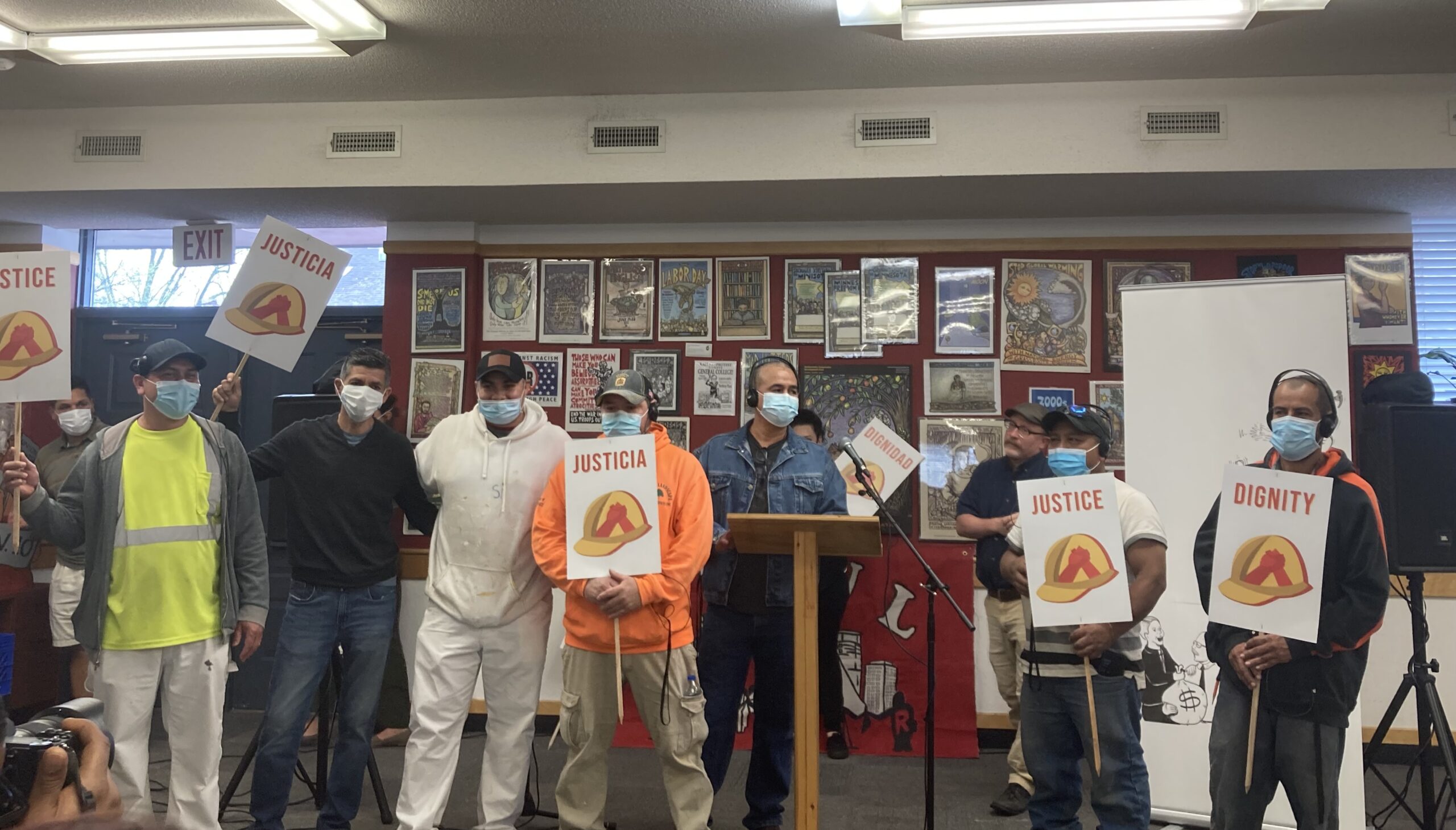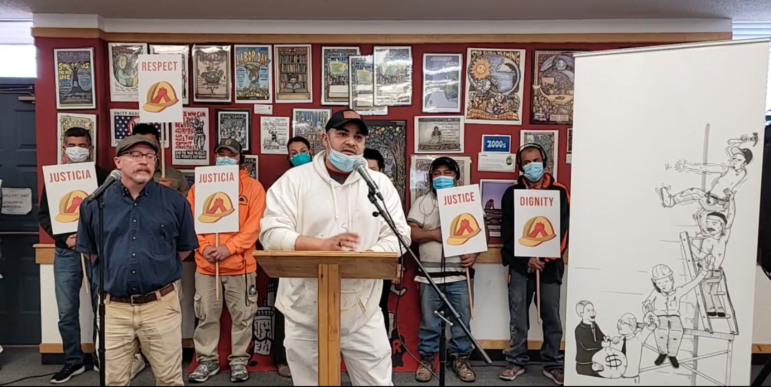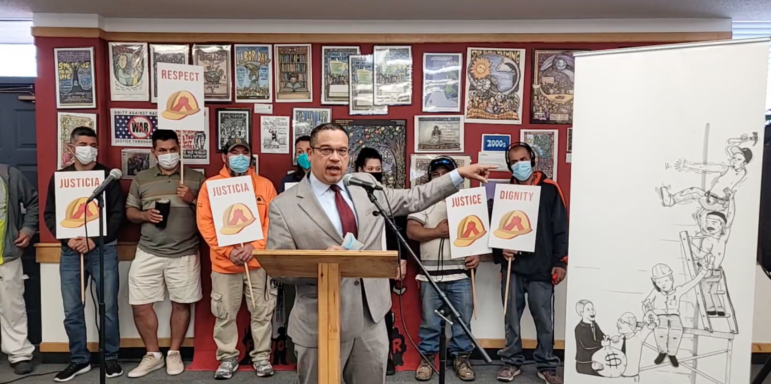

Share
“I want to make a clear message so that developers, when you’re going to sleep at night, you understand what’s happening to us. I want you to remember the contractors you hired that didn’t pay the workers…when are you going to pay the workers?” said construction worker and CTUL member Pedro Carbajal in Spanish through a translator. “We are the ones that work every day…we are the ones that are sweating.”
People hear of good wages in the construction industry, but the reality can be different for those who have nonunion jobs or work for corrupt contractors. According to a report from the Midwest Economic Policy Institute, one in five workers in Wisconsin, Illinois, and Minnesota experiences wage theft, and the payroll fraud costs taxpayers hundreds of thousands of dollars per year. On top of that, construction is one of the most dangerous and unsafe industries to work in, before and during the COVID-19 pandemic.
A worker-led conversation on human rights
“I’m owed approximately 110,000 dollars in stolen wages,” said Daniel Sanchez in Spanish through a translator. Sanchez worked with a company called Prime Construction Solutions, which works with many Twin Cities projects. “We know that we’re not going to change this industry by getting rid of just one subcontractor,” said Sanchez. “Developers need to work with us to put an end to wage theft and other abuses in the industry.”
Construction workers have been trying to start a conversation with building and real estate developers on wage theft and labor trafficking, but haven’t received much of a response. They’ve invited almost a dozen developers to meet with workers and join a new program holding them to better labor standards.
CTUL and the Building Dignity and Respect Standards Council hosted a press conference on Thursday, urging developers and contractors to change their business models and participate in the Building Dignity and Respect (BDR) program. The human rights program is modeled after the Worker-driven Social Responsibility Network and inspired by the Coalition of Immokalee Workers in Florida and the Fair Food Program.
Minnesota passed one of the strictest laws against wage theft in 2019. According to a BDR report, the industry in Minneapolis and St. Paul has been facing a human rights crisis of wage theft and labor trafficking.
Carbajal was one of the workers who traveled to Florida and learned about the worker-led program there. He and other worker leaders are bringing what they learned about organizing back to Minnesota. “We heard some sad stories…I never knew that there was a place in the U.S. that had such intense worker exploitation quite like I saw in Florida,” said Carbajal. “What I saw is workers taking leadership to hold corporate interests accountable.”

Worker-informed standards and agreements
According to BDR council director Doug Mork, developers join the program by signing a legally-binding agreement to abide by human rights standards informed by workers’ lived experiences. These standards include protection from wage theft, physical and sexual abuse, and access to safe working conditions and fair pay. Workers attend worker-designed education sessions that will teach them how to defend their rights.
Sometimes, workers aren’t aware of their rights and are afraid to speak out because they need their jobs. Employers take advantage of this economic insecurity and retaliate after workers stand up for themselves. All of these issues compound for low-wage and historically-marginalized and stigmatized folks, who face higher risks when employers retaliate and discriminate against them.
“I’m not afraid,” Carbajal said. “I’m not afraid to speak in front of cameras in public, anywhere. Who should be afraid of this are the developers that know that this is happening on their projects.”
The council will audit projects and contractors, monitor job sites, and investigate complaints received on a 24/7 worker support line. They will resolve issues and develop compliance plans in the event of violation. If a contractor cannot maintain compliance, they won’t be able to work for developers that participate in the program.
Accountability and enforcement
Minnesota Attorney General Keith Ellison also spoke at the conference. “Our anti-wage theft group has been pretty busy–we’ve returned hundreds of thousands of dollars to workers,” said Ellison. “It is my hope that I don’t have to come knocking on your door, but if I’m getting reports that workers are being stolen from, and we can prove that it’s true, we will take enforcement action.”

The BDR council has reached out multiple times to almost a dozen developers in the area, and only one, Yellow Tree, met with workers. None of the developers have signed agreements.
The council reached out to Continental Properties, Dominium, Doran Properties Group, Enclave Companies, Hall Sweeney Properties, MWF Properties, Perkins and Levin, Roers Companies, Solhem Companies, and United Properties.
This announcement comes on the heels of workers’ recent allegations of wage theft against the billionaire owners of the Vikings football team, whose real estate company hired Absolute Drywall, a contractor with a history of violating labor law, to build projects in Eagan. The Minnesota Department of Labor and Industry recently recovered over $44,000 in prevailing wages for misclassified electrical workers.
A coalition is looking for signatures on a petition related to the Vikings development:
vikings-petitionAbby Alldaffer, a project manager from South Minneapolis community real estate corporation Seward Redesign, spoke on the responsibility of developers. “That is on us as developers to make sure the project team is given the best chance to do their best work,” said Alldaffer. “It will give our city the quality of build it deserves, by taking care of those who craft the places and spaces we call home.”
Carbajal, who lives in Blaine with his wife and children, said he’s seen how hard it can be for families. “We know that money doesn’t equal happiness,” said Carbajal. “But we also know that if you don’t get paid, you can’t cover your basic bills.”


Misclassification of wage workers has been solved in California by our state Supreme Court. All wage workers must be hired as employees–no independent contracting at all. Now it’s up to our regulatory agencies to enforce the rule.
Labor’s focus on misclassification ignores the worse issue, though–employers who don’t pay their workers at all. States routinely report that unpaid labor is much more important to workers and their state agencies than misclassification, because misclassified workers are at least employed and paying taxes, even though they aren’t being paid enough.